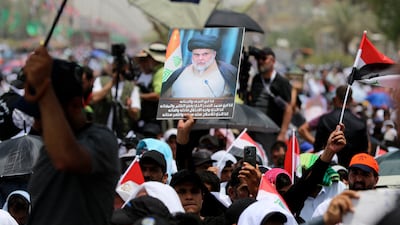Iraq is in dire need of a patriotic prime minister with substantial political backing to be able to deliver and uphold the rule of law, according to experts.
However, the formula seems nearly impossible to achieve, as the country this week entered its longest period without a government.
Ten months after a general election was held, deadlock among Iraq's political main groups has meant that parliament has been unable to select a prime minister and a president.
There are currently two main camps led by powerful Shiite leaders. The first is led by Moqtada Al Sadr, a populist cleric whose bloc won the most seats in the election.
But Mr Al Sadr failed to form a government with allied Sunni and Kurdish parties, prompting him to order his MPs to resign last month and pass the responsibility of government formation to the rival Co-ordination Framework.
The Framework has 130 members of parliament and is primarily led by former premier Nouri Al Maliki, a close ally of Iran.
It consists of Iran-backed political parties — several linked to pro-Iran militias — and finally agreed on a candidate for the role of prime minister this week. They have chosen Mohammed Al Sudani, who held several posts in former governments and is close to Mr Al Maliki.
Mr Al Sudani will still need at least tacit endorsement from Mr Al Sadr, according to experts. While the cleric no longer has seats in parliament, he commands hundreds of thousands of loyalists who can quickly be mobilised for protest.
Mr Al Sadr's position was made clear on Wednesday night as his supporters stormed parliament over Mr Al Sudani's nomination. A parliamentary session was scheduled for Thursday but chances of that happening are slim.
Although it is not set in stone, since 2003 an agreement among Iraq’s elite set aside the post of president for a member of the Kurdish community, the prime minister's pots for a Shiite and the parliamentary speaker's post for a Sunni.
Other government posts are also divided among the political parties based on religious and ethnic backgrounds.
“A strong and patriotic prime minister could save Iraq, but it would require them to put their life on the line and to cross the militias' red lines in a decisive showdown,” said Michael Knights, a fellow at the Washington Institute who studies Iraq's military and security.
If that can be achieved then the next prime minister would have to “defeat corruption, oil dependency and climate change ― but at least it would have a chance”, Mr Knights told The National.
“The militias are just crows waiting for Iraq to die: Iraq needs a doctor, not scavengers," he said.
Every prime minister since the US-led invasion of 2003 has failed to manage the Iraq's security, economic and political issues.
They faced the challenge of improving living conditions and public services and making sure that employment opportunities are available to everyone.
However, poverty and unemployment have increased year after year, causing widespread anger in the street and among the younger generation.
Iraq was placed 160th out of 180 countries on Transparency International’s corruption perception index for 2020.
"The role of Iraq’s prime minister is like a strong hand of cards: a good player can use it to win the game, a bad player can waste it," Mr Knights said.
"Every senior Shiite politician still wants it, and they all love being prime minister when their chance comes. That doesn’t mean they all deserve it," he said.
Mustafa Al Kadhimi, the prime minister of the caretaker government, tried to curb influence of the Iran-backed militias but failed.
He has made reform promises since assuming office in May 2020 but has mostly been unable to keep them.
Mr Al Kadhimi does not belong to a political party or lead a militia; he is a former journalist and intelligence chief with limited political influence, which is why he probably will not get another term despite international support, according to experts.
The key for any prime minister to succeed is broad political support from all the parties, Sajad Jiyad, a fellow at the Century Foundation in New York, told The National.
"I don't think any prime minister alone can save the country, it’s not a matter of the type of prime minister, it's whether the political parties will allow that reform to happen, whether they can clamp down on corruption," Mr Jiyad said.
"It is also about whether they can give the premier the chance to run the government the way he sees fit, without political interference."
Iraq's internal and external politics have long been dictated by foreign states, including Turkey, Iran and the US.
So it is not simply a matter of what the prime minister can do, it is also what the political elite are willing to do.
"At this stage it is not clear if they are willing to go through some reform and ensure the next government will be a success," Mr Jiyad said.
Iraq has not had a prime minister who has been able to "contest with the political parties as some of them have armed wings".
Once that person has the political will and domestic support then Iraq can see some progress, Mr Jiyad said.


